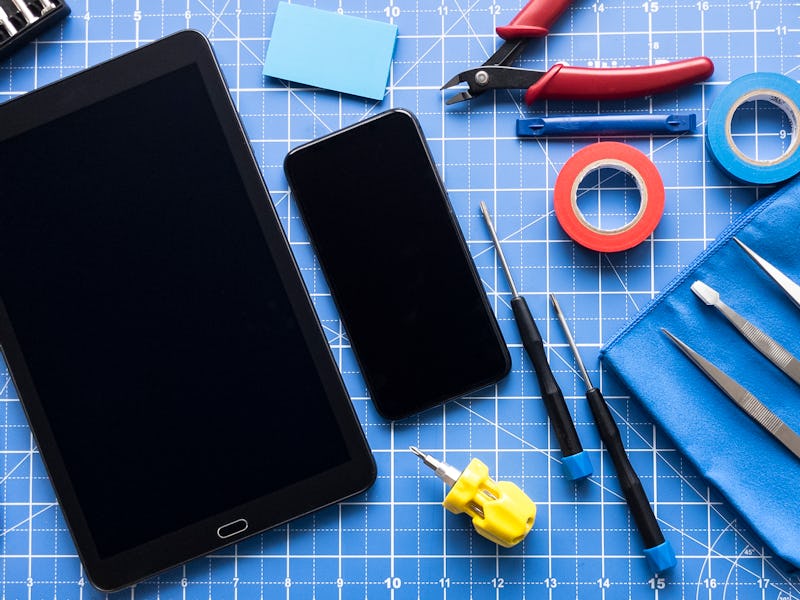Here's how fixing our gadgets could get a lot easier (and cheaper)
Plus: Plastic’s promising wooden alternative.

This Halloween, you may have ghosts, zombies, or werewolves on your mind, but a real-life phenomenon is perhaps even scarier than these mythical creatures: A cracked iPhone.
Such a tragedy can end with a costly visit to the Genius Bar, where you’re at the mercy of Apple’s technicians. Thankfully, a new bill could completely transform the way we repair smartphones, laptops, and other personal devices. The process could get a lot cheaper and easier for those of us not adept in electronic repair.
Ch-ch-changes — This past June, the New York state legislature passed the country’s first right-to-repair bill. It requires companies that sell “digital electronic products” in the state to make parts, tools, and instructions available to consumers and independent stores.
“For independent repair shops, this news is huge: Independent shops will finally be able to compete with manufacturers, resisting the repair market consolidation manufacturers have created by restricting access to parts and tools,” wrote repair resource website iFixit in a blog post.
Consumers would benefit, too, by accessing parts and services more cheaply — and they could even get the job done themselves.
Other states have passed right-to-repair legislation, though not quite as comprehensive. For example, a 2020 Massachusetts law only applies to car data, and a 2022 Colorado law covers wheelchair repairs.
A New York bill could change the way we approach broken gadgets, empowering independent businesses and consumers.
Honey, I shrunk the bill — Earlier drafts of the New York bill covered all sorts of tech, including gaming consoles, microwaves, and lawnmowers, according to recent reporting by The Albany Times Union. But due to lobbying efforts from trade associations and businesses, lawmakers were pressured to limit the bill, excluding lawnmowers, microwaves, and other home appliances.
Moving forward, the bill still needs a signature from Gov. Kathy Hochul — and she could always say no. But if it does pass, New York could set an example for the rest of the country and give more of America a say when it comes to our oft-broken gizmos.
Read more about the bill here.
On the horizon ...
Transparent wood could make its way into your straws (and other daily items) and prove far more eco-friendly than plastic.
Plastic straws often prove a soggy disappointment, but fans of iced beverages need not fret. We may one day make them out of a wood-based plastic alternative that holds its own against your drink of choice.
This futuristic material is flexible, moldable, and see-through, just like traditional petroleum plastics. But rather than being derived from fossil fuels that worsen climate change, it’s mostly made of trees.
A recent review published in Science of the Total Environment suggests that transparent wood holds serious potential for reducing carbon emissions.
The researchers found that wood-based materials are up to 10 million times more sustainable compared to polyethylene, the most widely produced plastic in the world. They also assessed five different manufacturing techniques for transparent wood to determine which was most ecologically friendly.
Of all the methods they evaluated, the scientists found that dissolving lignin in an alkaline solution and replacing it with epoxy proved the greenest from start to finish.
As more and more researchers dig into transparent wood’s potential, “it will only be a matter of time till we see real-life applications,” says Peter Olsén, an organic chemist at the Royal Institute of Technology in Stockholm, Sweden, who wasn’t involved in the new study.
Read the full story to find out more.
Here’s what else we’re reading...
- Scientists say they can decode thoughts from brain scans. The Scientist breaks it down.
- Building more solar capacity in Europe would prove 10 times cheaper than continuing to run gas-fired power plants. The Russia-Ukraine conflict has led to skyrocketing gas prices, but increased investment in solar could ease the transition, according to pv magazine.
- A newly discovered compound could treat antibiotic-resistant MRSA bacteria. SciTechDaily has the details.
- New stretchy battery packaging keeps out moisture and gas. Scientists have long tried to develop flexible batteries to make wearables more practical, according to a press release.
- An Australian online age-verification system for adult content could expose people’s highly sensitive data. The Guardian takes a look.
This has been HORIZONS, a newsletter that explores the innovations of today shaping the world of tomorrow. Subscribe for free.
This article was originally published on